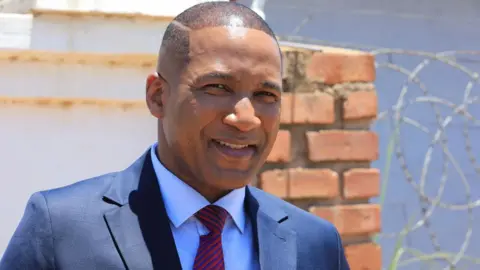Duma Boko last Friday took the oath of office as President of Botswana at Gaborone, the capital’s national stadium.
This cemented a whirlwind change of government, which began with Boko’s stunning landslide victory over the Botswana Democratic Party (BDP) which ruled the country since its independence from Britain on September 30, 1966.
Former president and ruling party candidate in the election, Mokgweetsi Masisi, who swiftly conceded defeat as the results became clear, was also at the ceremony, which was also attended by presidents of other southern African countries, including Madagascar, Namibia, Zambia and Zimbabwe.
At the event, 54-year-old Boko, a human rights lawyer turned politician, told Batswanas that he is now the living embodiment of his country’s “Deep and true resolve”.
- Coalition condemns arrest of woman for criticising banditry in Sokoto
- FG proposes N47.9trn budget for 2025
He encouraged them further, saying: “Together, we usher in a new political dawn… Acknowledge the role that you played, and continue to play in its unfolding.”
Not many expected the incredulity of the BDP’s overwhelming defeat in the elections held on October 30, 2024. Of the 61 seats in the National Assembly, Boko’s Umbrella for Democratic Change (UDC) coalition won 36 seats, the Botswana Congress Party – 15, Botswana Patriotic Front won five seats, and the former ruling BDP – four, and an independent candidate won a seat.
Botswana’s Parliamentary Republic has been governed by the Constitution since independence, making it the longest uninterrupted democracy in Africa. Considered as one of the most stable democracies in Africa, Botswana has been dominated by a single party since independence. And its liberal democratic dispensation with enshrined protection of basic rights and freedoms has endured while its Constitution has remained relatively intact, with a few minor modifications.
Daily Trust congratulates President Boko and urges him to squarely face the underdevelopment challenges facing his country. After all, this arid and sparsely populated country of some 2.6 million people is facing very high levels of unemployment at 27.6% as well as a poverty rate of 38%.
According to a report by the Southern African Development Community’s (SADC) observer mission, a voter turnout of 80 per cent was buoyed with young people, who make up around 34 per cent of the over one million voters were the segment, who handed the Boko coalition the shocking electoral victory, hoping it would quickly resolve their main concerns – unemployment and reversing the slump in the economy.
It is interesting that one of Boko’s key promises was the diversification and transformation of the economy from over-reliance on minerals, particularly diamonds, which account for 90 per cent of exports. He also promised to raise the basic pay, students’ allowances and old-age pensions. He pledged to make matters afflicting the youth a priority as around 70 per cent of the country’s population is below 35 years old.
We also urge him to tackle corruption, which escalated under the former government.
The new government should lead Botswana back to the era before the mid-2000s when it was touted as a reference point of good governance in Africa by international agencies and observers. President Boko should reinvigorate the country’s enviable positive economic and social indicators while entrenching Botswana as a land of transparent, free and fair elections.
He should work assiduously to restore trust and credibility in government and its institutions, including the judiciary while enthroning transparency and accountability in order to end wasteful expenditure.
The continent has much to learn from Botswana with its peaceful and democratic change of government and transfer of power as it has become a beacon of light and hope in Africa. Its deeply rooted democratic culture, a truly independent electoral commission and the comparatively low dependence of the political elite on state resources are worthy of emulation.
Also, as it grows the continent’s oldest democracy, Batswanas should clearly pursue inclusivity and improved relations between the dominant Tswana and other minorities. This is most important as the new president is of the Xhosa ethnic minority.
While maintaining its traditional neutral role as the ‘Switzerland of Africa’ just as it deepens relations with other countries of the Global South, the outing of the former government should serve as a big lesson for other ruling parties across the continent that electoral defeat looms when they take the people for granted. The increasingly dominant youthful population are growing impatient for change and Batswanas have led the way by rejecting government of patronage, clientelism and the fear of change.
This is what the new government, and other governments in Africa should learn and start providing solutions to pervasive unemployment, social injustice and the high cost of living.
Botswana has sent a message to the world, especially Africa that democracy is alive and that institutions can work transparently for the advancement and development of their countries.

 Join Daily Trust WhatsApp Community For Quick Access To News and Happenings Around You.
Join Daily Trust WhatsApp Community For Quick Access To News and Happenings Around You.

